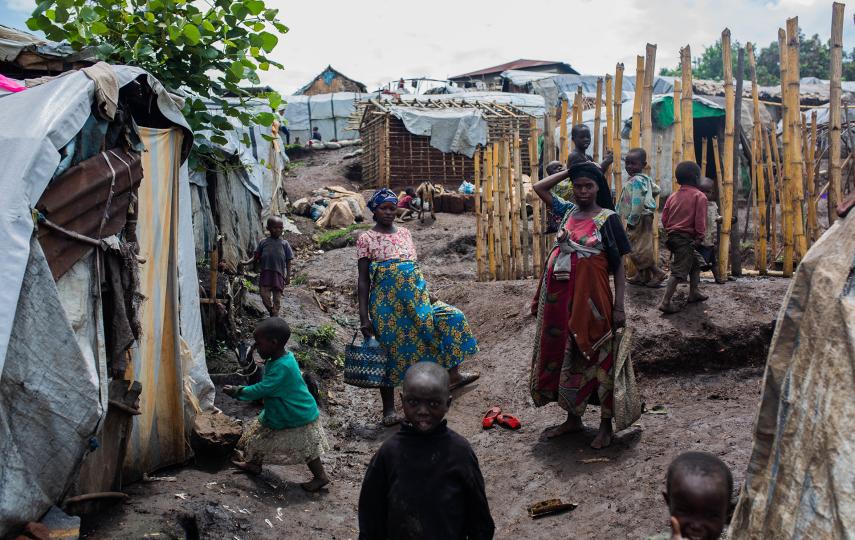An operational review that detailed widespread corruption and sexual exploitation in humanitarian aid operations in the Democratic Republic of Congo has been made public after a draft version was leaked to The New Humanitarian.
The final version of the 80-page review – funded by DFID, the UK government department responsible for overseas aid – shows the domino effect of corrupt practices in Congo, impacting everything from staff recruitment to the delivery of aid. The report was released on Monday, a month after TNH obtained a draft.
Sexual abuse and exploitation by aid workers was described as being widespread, with very few cases having been investigated because of ineffective reporting systems and perpetrators using money and influence to keep survivors and their families quiet.
Parts of the final report – which comes as cash-strapped governments look to cut aid amid the COVID-19 pandemic – have been altered compared to the draft copy TNH obtained as part of a months-long investigation into aid operations in Congo, where hundreds of millions of dollars of foreign aid are spent annually.
Read more → EXCLUSIVE: Leaked review exposes scale of aid corruption and abuse in Congo
The draft version made allegations that the selection committee of Congo’s humanitarian pooled fund – a major pot of funding run by the UN’s emergency aid coordination body, OCHA – had demanded kickbacks from national NGOs in exchange for contracts. The final version anonymises the funding mechanism, drawing attention away from the UN.
Language was also changed in a section on the death of Cameroonian epidemiologist, Richard Valery Mouzoko Kiboung, who was killed in April 2019, in an attack while working for the World Health Organization during the Ebola outbreak in eastern Congo.
The draft version suggested that the doctor was murdered after raising concerns about questionable practices in the response, which the authors identify in both copies as including the rental of vehicles at “exceptionally” high prices and large payments to security services for military escorts. These practices created “significant tensions” among individuals who sought to benefit from response funds, according to the review.
“Attempts by some whistle-blowers to denounce certain practices have at best been stifled and at worst have resulted in death, such as the case of Dr Richard Valery Mouzoko Kiboung,” the draft said.
But in the more vaguely worded final version, the doctor’s killers are alleged to have “targeted the Ebola response and those that represented a possibility to the reduction of circulating resources”.
François Grunewald, one of the report’s authors, told TNH his team was not pressured to modify the document and explained the changes by saying they “didn’t want to create such a shock and antagonise organisations to the point of not achieving our objectives”.
“We do not want our report to jeopardise humanitarian aid in a context where some actors are already seeing a diminishing level of resources due to the COVID-19 pandemic,” he said.
A well-placed source who asked not to be named due to the sensitivity of the issue said OCHA and the WHO were “unhappy” with the draft report and requested details be changed because agencies had agreed to participate on the basis that individual organisations would not be singled out.
The source added that the authors had veered outside the agreed scope of the review, which was intended to identify common issues and risks affecting humanitarian organisations in Congo – not investigate particular agencies.
Joseph Inganji, the head of OCHA in Congo, told TNH that the agency did not ask for the pooled fund section to be changed. He said he wrote to the authors requesting clarity on the allegations as part of the review’s agreed process and that the authors had made an independent decision.
“We never asked it to be removed,” he said.
The WHO did not immediately respond to questions on Wednesday.
The operational review – written by independent consultants contracted by the aid consultancy firm Adam Smith International – was commissioned earlier this year by an anti-fraud taskforce created by UN agencies and aid groups in Congo after the NGO Mercy Corps discovered a large-scale fraud scheme in late 2018.
Read more → EXCLUSIVE: Congo aid scam triggers sector-wide alarm
According to an internal Mercy Corps investigation, the multi-layered aid scam – first made public after a nine-month investigation by TNH – likely affected multiple NGOs and went undetected for more than a decade, triggering sector-wide corruption concerns.
The UN’s humanitarian coordinator in Congo, David McLachlan-Karr, said on Monday that the report’s recommendations would be reviewed by aid groups in Congo and a “roadmap” for future actions laid out by September.
Grunewald said he and others would be running a series of remote workshops with aid organisations in the country to discuss the report’s findings.
Five million people are currently displaced in Congo, which is one of the world’s longest-running humanitarian crises. Hundreds of thousands of people have been uprooted in recent months alone.
pk/pd/ag




